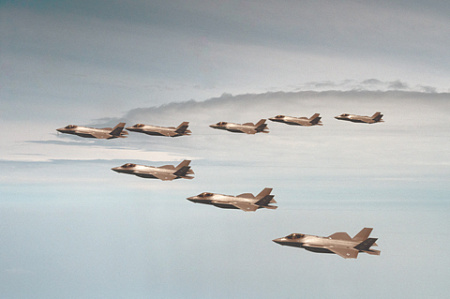
The potential sale of advanced F-35 fighter jets to Saudi Arabia is now under high-level review within the Pentagon, marking a significant advancement in Riyadh’s bid for the stealth aircraft. The request, initially submitted to the Trump administration this year, has navigated through the US military’s political department and landed on the desk of Pentagon chief Pete Hegseth. This development, however, faces considerable geopolitical hurdles, primarily stemming from Israel’s steadfast opposition, which views the F-35 as critical to maintaining its qualitative military edge (QME) in the volatile Middle East. Israel currently stands as the sole operator of these fifth-generation stealth fighters in the region, a status it fiercely protects.
Sources close to Reuters reveal that Saudi Arabia’s ambition to acquire up to 48 F-35 jets gained momentum after months of deliberation within the Pentagon’s political arm. Yet, despite this progress, Washington has not reached a final decision on the export. Any definitive contract would necessitate not only executive approval but also the crucial endorsement of the US Congress, a body that has historically demonstrated resistance to certain arms sales to Riyadh, reflecting broader bipartisan concerns over human rights and regional stability.
Critically, the timing of this advancement coincides strategically with the anticipated visit of Saudi Crown Prince Mohammed bin Salman to the White House on November 18. This trip is particularly noteworthy, marking the Crown Prince’s first visit to the US since 2018, a period during which his international engagements were significantly curtailed following the global outcry over the assassination of journalist Jamal Khashoggi at the Saudi consulate in Istanbul. The visit is expected to be a pivotal moment for bilateral relations, potentially setting the stage for significant announcements.
This renewed dialogue on F-35s unfolds against a backdrop of extensive US-Saudi economic and strategic cooperation. During then-President Trump’s Middle East tour in May, Washington and Riyadh sealed a sprawling ‘mega-deal’ worth over $600 billion, encompassing a wide array of agreements and investment commitments. Recent examples include Boeing’s $4.8 billion deal to supply 737-8 passenger jets to Saudi carrier AviLease, alongside Saudi commitments to invest in US data centers and energy infrastructure, underscoring the deep interwoven economic ties between the two nations.
Observers anticipate the Crown Prince’s upcoming visit will likely yield further substantial contracts. Sources cited by The New York Times suggest that a bilateral nuclear cooperation agreement is high on the agenda, under which Riyadh seeks Washington’s assistance in developing a full-cycle nuclear industry. The F-35 acquisition will undoubtedly be a central topic of discussion. Furthermore, the US leadership is expected to press the Saudi delegation on the importance of signing the Abraham Accords, a series of normalization agreements between Israel and several Arab nations. However, Crown Prince Mohammed has publicly hardened his stance on this issue following the outbreak of conflict in the Gaza Strip.
Riyadh’s intensified push for enhanced air defense capabilities, exemplified by the F-35 request, can be partly traced to incidents like the September 9 event, where Israeli fighters reportedly entered Qatari airspace unimpeded to strike a Hamas political bureau meeting in Doha. This incident reportedly enabled Qatar to secure a unique security guarantee from the US, a privilege not afforded to other Gulf states, highlighting regional vulnerabilities and the drive for advanced protection among Arab nations.
Despite the strategic impetus, strengthening US-Saudi military-technical cooperation, especially regarding the F-35, faces significant resistance. A segment of US Congress members and elements within the National Security Council advocate for conditioning any F-35 deal on the full normalization of official relations between Saudi Arabia and Israel. Critically, the government of Prime Minister Benjamin Netanyahu has reportedly voiced unequivocal opposition to the stealth fighter export, arguing that F-35s in Saudi hands would undermine Israel’s Qualitative Military Edge (QME).
The QME doctrine, enshrined in US law, mandates that Washington ensure Israel maintains military superiority over its regional adversaries in the Middle East and North Africa. This principle is predicated on the understanding that Israel, situated in a potentially hostile environment, relies on technological and tactical superiority for its security. It guarantees that Israel receives more advanced US weaponry than its neighbors, allowing it to remain the sole regional operator of fifth-generation stealth fighters, which it further modifies for its specific offensive requirements.
A notable challenge to the QME doctrine emerged in 2020 during the expansion of the Abraham Accords, when the UAE sought F-35s. The Wall Street Journal reported that Washington had implicitly promised Abu Dhabi the jets as part of an unofficial incentive package, despite Israeli objections. However, those fighters were never delivered, with the US citing the UAE’s inability to adequately protect the F-35’s sensitive technological secrets from third parties like Russia and China. Such past vacillations in F-35 contract fulfillment raise considerable doubts about whether Saudi Arabia will ultimately secure the advanced jets, underscoring the delicate balance Washington must strike between its strategic alliances and regional security imperatives.
